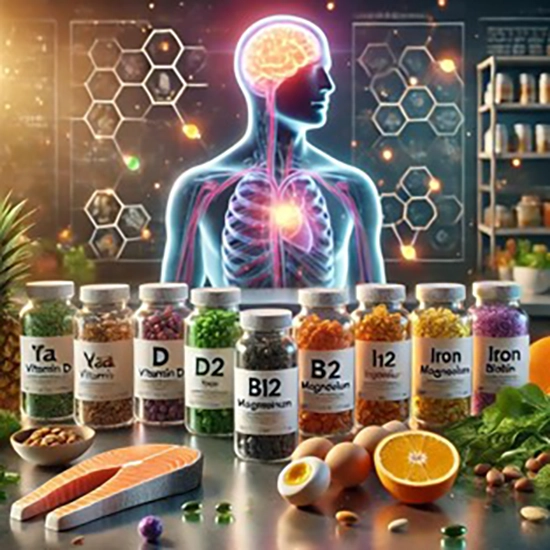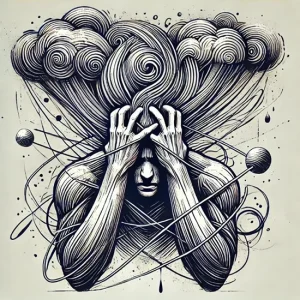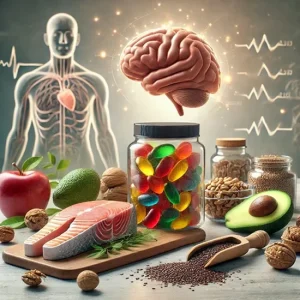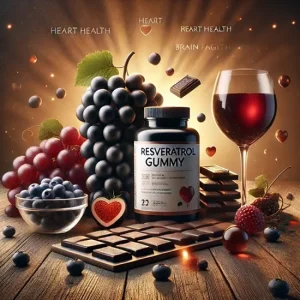Signs of Vitamin and Mineral Deficiencies
Do you often feel tired and drained? Is your hair thinning, or are your nails becoming brittle? These aren’t just minor complaints—they could be your body’s way of warning you about hidden vitamin and mineral deficiencies! Over time, these deficiencies can lead to low energy, a weakened immune system, and even mood swings. So, which essential nutrient might you be lacking? Let’s dive into the signs of vitamin and mineral deficiencies!
Vitamins are obtained from food since the body either cannot synthesize them at all or does not produce enough to meet its needs. In Turkish cuisine, vegetable and fruit consumption may be lower than in other diets due to traditional eating habits. As a result, malnutrition, insufficient vitamin synthesis, and inadequate intake during the winter months can lead to certain vitamin deficiency problems.
Vitamin and Mineral Deficiencies: Symptoms, Causes and Solutions!
Vitamin D Deficiency: Do We Get Enough Sunlight?
Vitamin D is a crucial vitamin for regulating calcium and phosphorus absorption, supporting the immune system, and maintaining bone health. It is synthesized in our skin through exposure to sunlight. However, insufficient sunlight, air pollution in urban areas, and spending too much time indoors can negatively affect vitamin D synthesis, eventually leading to a deficiency. Foods that contain vitamin D include fatty fish such as salmon and sardines, egg yolk, liver, and fortified dairy products. However, a lower intake of these foods in our dietary habits contributes to widespread deficiency.
Bone and muscle pain (especially in the back and legs), chronic fatigue and weakness, a weakened immune system, frequent infections, depression, mood swings, and hair loss are common symptoms of vitamin D deficiency. Vitamin D is necessary for calcium absorption in the intestines, which makes it essential for bone health. Current guidelines recommend 600 IU daily for individuals under 71 years old and 800 IU daily for those older than 71. However, many experts suggest 800 IU to 1,000 IU for adults. Generally, up to 4,000 IU is considered safe, but exceeding this amount may be toxic.
Vitamin D deficiency should be supported with a proper diet. Softgel, drop, or other supplement forms should be used to compensate for the deficiency when it cannot be obtained through food.
B12 Deficiency: Vegans And Vegetarians Should Be Careful!
B12 plays a role in nervous system health, DNA synthesis, red blood cell production, and energy metabolism. However, it cannot be synthesized in the body and can only be obtained from food. So, nutritional deficiencies or absorption problems cause a common B12 deficiency. These deficiencies manifest themselves as numbness in the hands, feet, arms, and legs, depression, memory loss, canker sores, anemia, pernicious anemia, and hair loss.
B12, which is only obtained from animal-based foods, is especially common among vegans and vegetarians. Therefore, plant-based B12 supplements have become popular among vegan and vegetarian individuals. Deficiency should be supported with sublingual tablets or medication. Supplements help compensate for what cannot be obtained from food.
Iron Deficiency And Its Relation To Nutrition
Iron is a vital mineral for the production of red blood cells that carry oxygen in the body, energy metabolism, and the immune system. In case of deficiency, it may lead to iron deficiency anemia, causing tiredness, weakness, and cognitive problems. Its symptoms include chronic tiredness, pale and colorless skin, dizziness, concentration problems, weak nails, shortness of breath, weak immunity, low blood pressure, cold hands and feet, and weak appetite.
Iron deficiency anemia is one of the most common types of mineral deficiencies in the Turkish population. This deficiency, which is especially prevalent among women, can unfortunately reach levels that disrupt the body’s essential functions. Irregular eating habits and insufficient consumption of animal-based foods are some of the main causes of this deficiency. Additionally, the high consumption of tea and coffee can hinder iron absorption. Therefore, iron supplements should be used to support iron intake, as dietary sources may not always be sufficient.
In the treatment of iron deficiency, consuming iron-rich animal products, as well as vegetables and legumes containing non-heme iron—such as spinach, beans, and chickpeas—is essential. Taking iron supplements or medications on an empty stomach and supporting absorption with vitamin C can significantly enhance iron uptake. This approach can help minimize anemia levels and replenish iron stores.
Magnesium Deficiency: Chronic Fatigue And Other Symptoms
Magnesium is one of the essential minerals that regulate biochemical reactions in the body. It plays a crucial role in muscle and nerve function, energy production, bone health, stress management, and heart rhythm regulation. Due to modern dietary habits and lifestyle factors, magnesium deficiency has become increasingly common, just like other vitamin and mineral deficiencies.
Magnesium deficiency, which can cause symptoms such as chronic fatigue, cramps in the hands and fingers, and muscle and joint pain, often results from irregular nutrition, frequent fast food consumption, a stressful and fast-paced lifestyle, excessive alcohol intake, intense exercise, and water loss due to excessive sweating. Magnesium deficiency is also associated with migraine attacks, depression, sleep disturbances, digestive issues, and constipation. You can support your magnesium intake by consuming nuts, green leafy vegetables, legumes, flaxseeds, chia seeds, and certain seafood. However, taking magnesium supplements in different forms, each with unique effects, may help improve your quality of life. You can incorporate various magnesium salts—either in combination or individually—into your daily diet, such as magnesium bisglycinate, magnesium malate, magnesium oxide, and magnesium taurate. These supplements are available in tablet, capsule, sachet, or gummy form. Experience the benefits of daily magnesium intake!
Attention On Fragile Nails And Hair!
Vitamin B7, also known as biotin, plays a crucial role in converting fats and carbohydrates from food into energy. Biotin, sometimes referred to as Vitamin H or Coenzyme R, is a member of the B-vitamin family. Although biotin deficiency is not very common, brittle nails and hair loss may indicate a lack of biotin. This is because biotin contributes to strong nails and hair by playing a role in keratin synthesis.
All vitamin and mineral deficiencies may go unnoticed due to dietary habits in Turkish society and the lack of sufficient education and awareness about health. Especially in rural areas, the symptoms of vitamin and mineral deficiencies are often ignored or mistaken for other health problems. Without adequate health knowledge and expert support, people may not realize their deficiencies in time.
We should know our bodies well and pay attention to the signals they send us. It is essential to listen to what our bodies are trying to tell us and meet their needs. Consulting a healthcare professional is a must. Taking more than what your body needs can lead to issues just like deficiencies do.
Challenge vitamin deficiencies with Your Gummie’s chewable gummy products!
Gummy Worlds brings you health with high-quality products!




